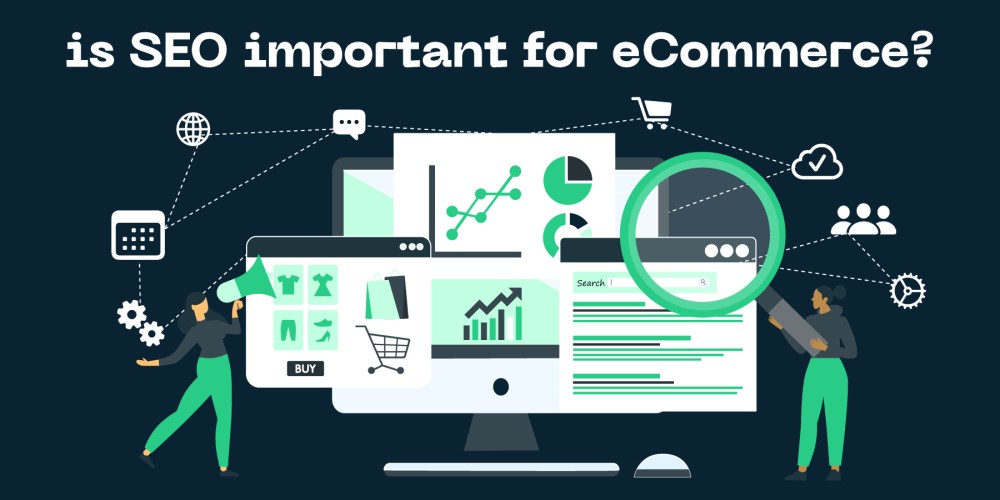How AI Influences Consumer Behavior in eCommerce

Key Takeaways
Understanding AI’s Role in eCommerce
Defining AI in eCommerce
Artificial Intelligence’s role in eCommerce is both transformative and expansive, reshaping how online stores operate and engage with consumers. At its core, AI in eCommerce is about leveraging data-driven algorithms to make informed decisions and automate processes that traditionally relied on human intervention. By analyzing vast amounts of customer data, AI can predict buying behaviors, personalize shopping experiences, and even optimize pricing strategies. The ability to anticipate what a consumer might want or need before they even realize it themselves is a game changer for eCommerce businesses looking to enhance conversion rates.
One of the most significant impacts AI has in eCommerce is through personalization. By collecting and analyzing data from customer interactions, AI systems can tailor product recommendations to individual preferences, leading to a more engaging and relevant shopping experience. This not only increases the likelihood of a purchase but also fosters customer loyalty and repeat business. Moreover, AI-driven chatbots and virtual assistants can provide immediate, personalized customer service, enhancing user satisfaction and streamlining the sales funnel.
Beyond personalization, AI also offers advanced tools for inventory management and demand forecasting, crucial for maintaining product availability without overstocking. Through machine learning algorithms, eCommerce platforms can better predict trends, adjust their offerings, and manage supply chains more efficiently. The insights provided by AI help marketers and store owners make data-backed decisions, reducing guesswork and allowing for more strategic planning. As eCommerce continues to evolve, embracing AI technology is not just an option but a necessity for businesses aiming to stay competitive and meet the ever-changing demands of their customers.
Key AI Technologies in eCommerce
Artificial Intelligence technologies are increasingly pivotal in eCommerce, fundamentally reshaping how businesses interact with consumers. Machine Learning and Natural Language Processing are among the key technologies driving these changes. Machine Learning algorithms analyze vast amounts of consumer data to predict shopping behaviors, enabling personalized recommendations that significantly enhance the customer experience. These sophisticated predictions empower eCommerce platforms to present products that align closely with consumer preferences, thereby increasing the likelihood of conversion. Natural Language Processing, on the other hand, allows for more intuitive and conversational interactions between consumers and digital interfaces, such as chatbots and voice assistants. These interactions not only streamline the shopping process but also provide personalized support and assistance, improving overall customer satisfaction.
Another critical AI technology is Computer Vision, which is revolutionizing the way consumers search for products online. By enabling visual search capabilities, Computer Vision allows consumers to upload images or screenshots to find similar products, which can be particularly useful for discovering items that are difficult to describe with words. This technology taps into consumer behavior that prioritizes convenience and immediacy, urging eCommerce businesses to integrate visual search features into their platforms. As a result, store owners and marketers can engage customers more effectively by offering a seamless and intuitive shopping experience, ultimately driving conversion rates higher.
In addition to enhancing consumer interaction, AI technologies play a crucial role in optimizing backend operations such as inventory management and pricing strategies. Predictive analytics, powered by AI, can forecast demand trends, ensuring that stock levels are optimized to meet consumer needs without overstocking. Dynamic pricing algorithms adjust prices in real-time based on consumer behavior, competitor pricing, and market demand, helping eCommerce businesses maximize profits while staying competitive. For store owners and marketers, leveraging these AI technologies means being able to respond rapidly to market changes and consumer demands, ensuring a more agile and responsive business model. In this fast-evolving digital landscape, understanding and implementing AI technologies is no longer optional but a necessary strategy for any eCommerce business aiming to influence consumer behavior and enhance conversion rates effectively.
Impact on Consumer Behavior
Personalization and Recommendations
In the rapidly evolving landscape of eCommerce, personalization and recommendations have emerged as pivotal elements in influencing consumer behavior. The integration of artificial intelligence into these processes allows businesses to tailor experiences at an individual level, resulting in a profound impact on how consumers interact with online platforms. Personalization powered by AI goes beyond just suggesting products; it provides a comprehensive understanding of consumer preferences, purchasing habits, and even potential future needs. This level of customization not only enhances the shopping experience but also significantly boosts consumer engagement and satisfaction, making it an indispensable tool for eCommerce store owners aiming to increase conversion rates.
AI-driven personalization enables marketers to deliver highly relevant content and product suggestions, which helps in capturing the consumer’s attention and fostering loyalty. By analyzing vast amounts of data from previous interactions, AI can predict what a customer might be interested in next, bringing a more intuitive shopping journey and reducing decision fatigue. This anticipative approach often leads to higher conversion rates as customers are more likely to purchase products that resonate with their current needs and preferences. Moreover, the ability to offer dynamic recommendations, tailored in real-time as consumer behavior changes, sets businesses apart from competitors relying on generic marketing strategies.
The impact of AI-powered recommendations on consumer behavior is further amplified by their ability to cross-sell and upsell effectively. By understanding the relationship between different products and consumer segments, AI can suggest complementary items or premium versions that a consumer might not have considered initially. This not only increases the average order value but also enhances customer satisfaction by presenting options that genuinely add value to their purchase. For eCommerce marketers, leveraging AI for personalization and recommendations is not just about driving sales; it is about creating a meaningful connection with consumers that encourages long-term loyalty and advocacy.
Customer Experience Enhancement
Customer experience enhancement through artificial intelligence (AI) is reshaping the landscape of eCommerce by deeply influencing consumer behavior. AI-driven personalization tools are at the forefront of this transformation, allowing eCommerce platforms to tailor experiences to individual consumer preferences on an unprecedented scale. By analyzing vast amounts of data with the help of a Customer Data Platform, AI can predict customer needs and present personalized recommendations, which can significantly increase engagement and conversion rates. For eCommerce store owners and marketers, leveraging AI to enhance customer experience is becoming not just a competitive advantage but a necessity in maintaining relevance in an ever-evolving digital marketplace.
The impact on consumer behavior is profound. AI enables real-time interactions, providing instant support and personalized shopping experiences which foster loyalty and increase customer satisfaction. Consumers now expect rapid responses and highly tailored experiences when shopping online. AI chatbots and virtual assistants are examples of tools that can provide such interactions efficiently, ensuring that consumer queries are addressed promptly. This immediacy and personalization can lead to higher conversion rates as customers are more likely to complete purchases when their journey is seamless and engaging.
Moreover, AI’s ability to analyze and predict consumer trends allows eCommerce businesses to refine their marketing strategies. By understanding consumer behavior patterns, businesses can optimize pricing, manage inventory more effectively, and develop targeted marketing campaigns. This strategic use of AI doesn’t just enhance the customer experience but also empowers marketers to make data-driven decisions that can significantly boost their return on investment. As eCommerce continues to evolve, those who harness the power of AI to enhance customer experience will likely remain at the forefront of consumer trends, capturing both loyalty and market share.
Optimizing Marketing Strategies
AI-driven Advertising
AI-driven advertising has revolutionized the way eCommerce businesses approach their marketing strategies. By leveraging advanced algorithms and data analytics, AI can optimize marketing campaigns to target specific consumer behaviors and preferences more accurately than traditional methods. This capability allows businesses to deliver personalized and relevant advertisements, increasing the likelihood of engagement and conversion. For eCommerce store owners looking to boost their conversion rates, AI provides the tools necessary to understand customer patterns and predict future purchasing decisions, enabling more informed strategic planning.
One of the significant advantages of AI-driven advertising is its ability to continuously learn and adapt. As consumer behavior and trends evolve, AI systems can automatically adjust marketing strategies to stay aligned with these changes. This adaptability ensures that marketing efforts remain effective over time, reducing wasted ad spend and increasing ROI. Additionally, AI can process vast amounts of data at unprecedented speeds, uncovering insights that might be missed through manual analysis. This data-driven approach empowers marketers to make decisions based on real-time information, enhancing the accuracy of targeting and personalization efforts.
However, while AI-driven advertising offers numerous benefits, it is crucial for eCommerce businesses to approach it with a strategic mindset. Store owners and marketers must understand that AI is not a one-size-fits-all solution but rather a tool that complements a well-rounded marketing strategy. It is essential to continuously monitor AI systems and ensure they align with broader business goals. Moreover, businesses should remain vigilant about ethical considerations, such as data privacy and transparency, when implementing AI solutions. By doing so, eCommerce businesses can harness the full potential of AI-driven advertising to influence consumer behavior positively and drive sustainable growth.
Predictive Analytics for Campaigns
In the world of eCommerce, understanding consumer behavior is crucial for optimizing marketing strategies, and predictive analytics has emerged as a powerful tool in achieving this goal. By leveraging AI-driven predictive analytics, marketers can gain deep insights into customer preferences and behaviors, allowing them to tailor their campaigns more effectively. These insights are derived from analyzing vast amounts of data, such as browsing history, purchase patterns, and even social media interactions, to forecast future buying behaviors. This approach enables marketers to anticipate customer needs and craft personalized marketing messages that resonate with individual consumers, thereby increasing the likelihood of conversion.
One of the most significant advantages of using predictive analytics in eCommerce campaigns is its ability to segment audiences more precisely. By identifying key behavioral indicators, marketers can group customers into distinct segments and target them with highly relevant content. This targeted approach not only enhances the customer experience but also improves marketing efficiency by ensuring that resources are allocated to the most promising leads. Moreover, by continuously analyzing data, predictive models can adjust and refine strategies in real time, allowing marketers to stay agile and responsive to changing consumer trends.
However, while predictive analytics offers substantial benefits, it also presents challenges that eCommerce marketers must navigate. Data privacy concerns and the need for high-quality data are critical considerations. To maximize the effectiveness of predictive analytics, it is essential for marketers to ensure that their data collection practices are transparent and comply with relevant regulations. Additionally, investing in robust data infrastructure and analytics tools is crucial for extracting actionable insights. By addressing these challenges, eCommerce businesses can harness the full potential of predictive analytics to not only optimize their marketing strategies but also to foster deeper customer relationships and drive long-term growth.
Challenges and Considerations
Ethical Use of AI
The integration of AI in eCommerce offers exciting opportunities to influence consumer behavior through personalized marketing strategies, intelligent product recommendations, and optimized customer service. However, with these opportunities come significant ethical challenges and considerations that must be addressed by store owners and marketers. One primary concern is the potential for AI to inadvertently perpetuate biases that exist in the data it learns from. This can lead to unfair treatment of certain consumer demographics, impacting brand reputation and trust. It is crucial for businesses to be vigilant in monitoring AI systems for such biases and ensuring that their AI implementations adhere to fairness and equality principles.
Another ethical consideration is data privacy. AI systems often require substantial amounts of consumer data to function effectively. While this data enables more personalized shopping experiences, it also raises questions about how much personal information consumers are willing to share, and how that data is stored and used. Businesses must navigate these concerns by being transparent about their data collection practices and implementing robust security measures to protect consumer information. Failing to do so can result in breaches of customer trust and potential legal ramifications under data protection regulations.
Finally, the transparency of AI systems is an ongoing challenge. Consumers have the right to understand how their data is used and how AI influences their purchasing decisions. As AI becomes more pervasive, it is crucial for businesses to provide clear and understandable explanations of AI-driven processes. This transparency not only helps build trust but also empowers consumers, enabling them to make informed decisions. By embracing ethical AI practices, eCommerce businesses can leverage the technology's full potential while maintaining consumer confidence and loyalty.
Data Privacy Concerns
In the age of AI-driven personalization, data privacy concerns pose significant challenges for eCommerce businesses. While artificial intelligence offers unprecedented opportunities to tailor shopping experiences, this customization relies heavily on the collection and analysis of consumer data. As an eCommerce store owner or marketer aiming to enhance conversion rates, understanding and navigating the landscape of data privacy is crucial. Effective use of AI requires a delicate balance between leveraging data for insights and respecting customer privacy preferences, as missteps in this area can lead to a loss of consumer trust and potential regulatory penalties.
One of the pressing challenges is ensuring transparency in data collection and usage. Consumers today are more informed and concerned about how their personal information is being used. They expect businesses to be upfront about the kind of data being collected and how it will be used to improve their shopping experience. This expectation necessitates that eCommerce businesses implement clear and concise privacy policies. Furthermore, offering customers control over their data through easy-to-understand settings can foster a sense of security and trust. By demonstrating a commitment to privacy, businesses not only comply with regulations but also enhance their reputations as responsible data stewards.
In addition to transparency, safeguarding consumer data against breaches is a critical consideration. The integration of AI systems may increase the potential attack surface for cyber threats. Thus, investing in robust cybersecurity measures is essential. Regular audits, encryption, and employing AI tools themselves to monitor and protect against potential vulnerabilities can help mitigate these risks. By prioritizing data security, eCommerce businesses can prevent potential data breaches that could damage their relationships with customers and incur significant financial and reputational costs. As AI continues to evolve, maintaining vigilance on data privacy will be a key factor in successfully leveraging its capabilities to influence consumer behavior positively.
Future Trends in AI and eCommerce
AI in Omnichannel Retail
The integration of AI in omnichannel retail is revolutionizing the way eCommerce businesses engage with consumers, offering a seamless shopping experience across various touchpoints. As AI technology continues to evolve, it is enabling retailers to understand and predict consumer behavior with increasing precision. By analyzing data from multiple channels such as websites, mobile apps, social media, and physical stores, AI systems can craft personalized experiences that cater to individual preferences and needs. This level of personalization not only fosters customer loyalty but also increases conversion rates by presenting the right products at the right time and in the right context.
One of the most promising future trends in AI-driven omnichannel retail is the use of advanced machine learning algorithms to optimize inventory management and pricing strategies. Through real-time data analysis, AI can predict demand patterns and adjust stocking levels accordingly, ensuring that popular items are readily available while reducing overstock of less sought-after products. Furthermore, dynamic pricing algorithms can be employed to adjust prices based on factors such as consumer demand, competition, and market trends, maximizing profitability while still offering competitive prices to consumers. For eCommerce store owners and marketers, embracing these AI capabilities could be a game-changer in enhancing operational efficiency and driving revenue growth.
Another trend to watch is the increasing sophistication of AI-powered chatbots and virtual assistants in providing customer support and enhancing the shopping experience. These tools are becoming more adept at handling a variety of customer inquiries, from product recommendations to troubleshooting issues, using natural language processing to deliver human-like interactions. By offering instantaneous and reliable support, AI chatbots can significantly enhance customer satisfaction and encourage repeat purchases. For marketers and store owners, leveraging these AI technologies provides an opportunity not only to improve customer service but also to gather valuable insights into consumer behavior and preferences, which can be leveraged to refine marketing strategies and improve product offerings.
AI for Sustainability in eCommerce
The intersection of AI and sustainability in eCommerce is poised to redefine how online businesses operate, offering not only efficiency and cost savings but also a means to attract increasingly eco-conscious consumers. AI technologies, such as machine learning algorithms and predictive analytics, enable eCommerce platforms to optimize supply chains, reduce waste, and improve energy efficiency, contributing to a more sustainable operational model. By leveraging AI to better forecast demand and manage inventory, businesses can minimize surplus stock and reduce their carbon footprint, addressing both environmental concerns and enhancing their brand image among sustainability-focused consumers.
Moreover, AI’s role in personalizing the shopping experience extends to promoting sustainable products, thereby influencing consumer behavior directly. Smart recommendation engines can analyze purchasing patterns and preferences to suggest eco-friendly alternatives or highlight products with lower environmental impact. This targeted approach not only caters to the growing segment of consumers who prioritize sustainability in their purchasing decisions but also helps businesses differentiate themselves in a competitive marketplace. The result is a win-win scenario where consumer engagement is enhanced through personalized experiences, and the overall sustainability of the eCommerce ecosystem is improved.
Looking ahead, AI-driven sustainability initiatives are expected to become a cornerstone of eCommerce strategies, as regulatory pressures and consumer demand for ethical business practices increase. Forward-thinking eCommerce businesses that integrate AI for sustainability stand to gain a competitive edge, fostering trust and loyalty among their customers. By prioritizing these initiatives, store owners and marketers will not only advance their environmental goals but also see potential improvements in conversion rates as they align with the values of a more conscientious consumer base. In this evolving landscape, investing in AI technology to support sustainable practices is not just a trend but a strategic imperative.
FAQS
How does AI enhance the personalization of the shopping experience?
AI analyzes consumer data to understand preferences and behaviors, allowing eCommerce platforms to offer personalized recommendations, targeted promotions, and tailored content, enhancing the overall shopping experience.
What role does AI play in predicting consumer purchasing behavior?
AI employs machine learning algorithms to analyze past purchasing data, identify patterns, and predict future buying behavior, enabling store owners to optimize stock and marketing strategies.
How can AI-driven chatbots influence consumer behavior?
AI-driven chatbots provide instant customer support and personalized shopping assistance, which can reduce cart abandonment rates and increase conversion rates by addressing consumer queries in real-time.
In what ways does AI improve conversion rates on eCommerce platforms?
AI improves conversion rates by optimizing product recommendations, personalizing marketing messages, and dynamically adjusting pricing strategies based on consumer behavior insights.
How does AI enhance SEO strategies for eCommerce businesses?
AI tools analyze keyword trends, competitor strategies, and consumer search behavior, enabling businesses to optimize their content and improve their search engine rankings more effectively.
What impact does AI have on managing and optimizing digital ads?
AI optimizes digital ad spend by analyzing consumer interactions and predicting which ads are likely to perform best, ensuring that budgets are allocated efficiently to maximize ROI.
How does ConvertMate leverage AI to improve eCommerce conversion rates?
ConvertMate uses AI agents to integrate seamlessly with analytics tools and shopping platforms, providing actionable insights that help eCommerce brands optimize their marketing strategies and increase conversion rates.



